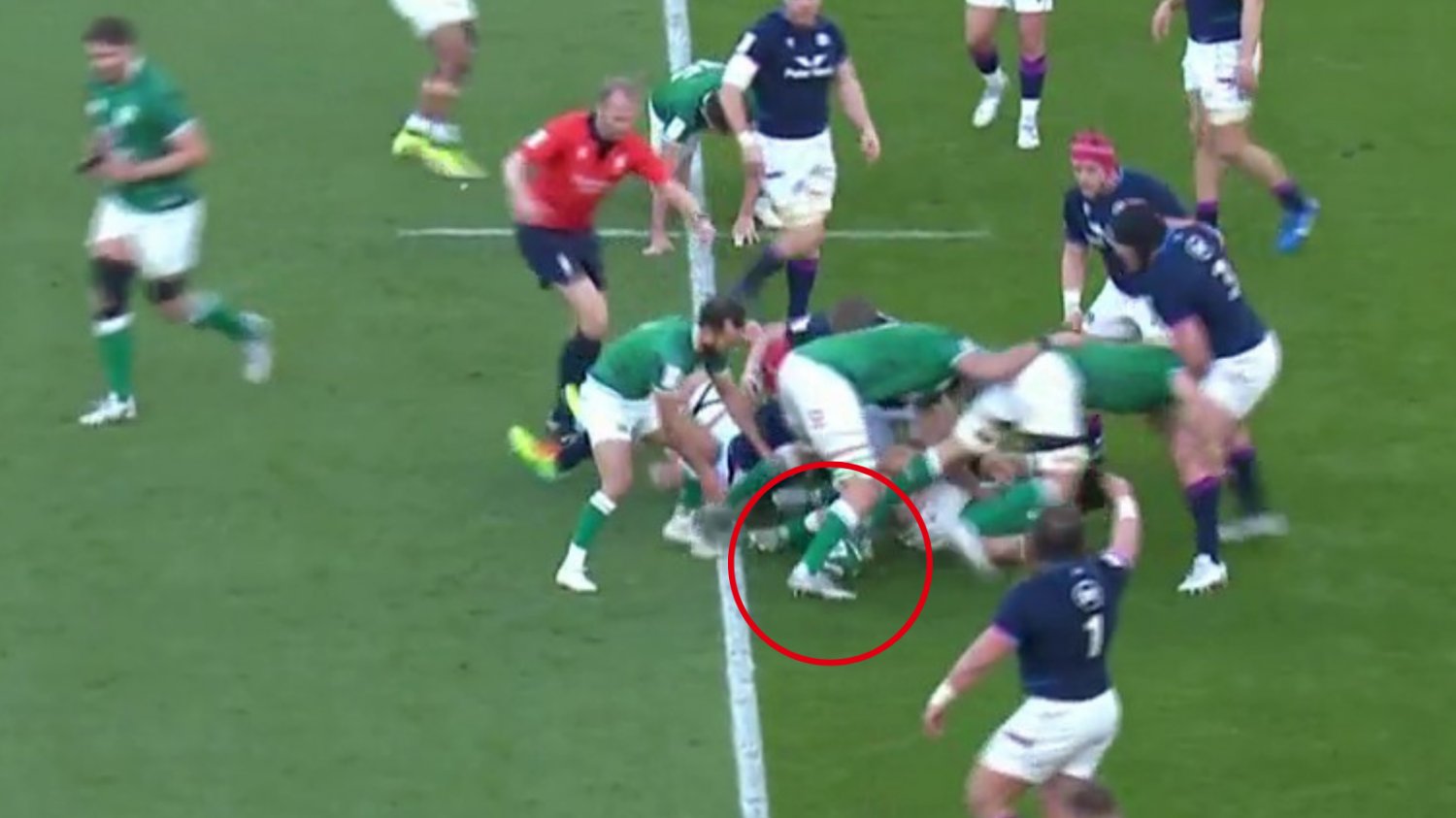The impact the 50:22 law had in its debut Six Nations
- 4210

The 2022 Six Nations saw the 50:22 law debut in the Northern Hemisphere's premier test Championship.
The law has been globally trialled since July last year in the hope that with this law, it would create more space across the pitch as players drop back to field tactical kicks - reducing defensive line speed.
If you are still unfamiliar with the law or how it works, here is a short explainer:
An adaption on the Rugby League 40/20 rule, the 50:22 law, sees a team retain possession of the ball if the team in possession kicks the ball from inside their own half indirectly into touch inside their opponents' 22, meaning the ball has to bounce before crossing the touchline and, if it does, the team that kicked will have the throw-in to the resulting lineout.
The ball cannot be passed or carried back into the defensive half for the 50:22 to be played. The phase must originate inside the defensive half.
How many 50:22s were there in the 2022 Six Nations?
There were eight 50:22s across the 15 Six Nations matches in its Championship debut. Ireland's Andrew Conway (2) was the only player who completed more than one during the competition, while Ireland completed more than any other side (4). Meanwhile, Tadhg Beirne was the only forward to complete a 50:22.
Scotland and Italy didn't complete one in the Six Nations, while England and France completed one apiece and Wales two.
Of the eight in the tournament, four eventually led to points from that visit to the opposition's 22. Wales claimed points from both of their visits to the opposition's 22 from the successful kicks.
Scotland and England conceded three each in the Six Nations, while Italy and Ireland kept a clean slate, not conceding one. Wales conceded one and France two.
The impact of the 50:22s on the Six Nations
There were none in the opening round of the competition, but Henry Slade certainly came close. After an England turnover, Slade looks to take advantage of the fact that Scotland's backfield is largely unmarked. He produces an excellent kick that seems destined to be a 50:22, but Stuart Hogg gets back just in time to divert the ball back in play.
The Scotland captain beats Max Malins to the ball, gets back to his feet, and saves his side. Before the introduction of the law, Hogg would have likely let this ball bounce into touch and Scotland would execute an exit plan from the resulting lineout.
France's Melvyn Jaminet executed a wonderful one against Italy in the last game of the opening round.
However, his teammates conceded a penalty beforehand rendering it pointless.
The first one of the Six Nations was one of the best, with Liam Williams nailing it, with a bit of luck, against Scotland.
While it was an underwhelming Six Nations overall for Wales, Wayne Pivac will be pleased that his side made the most of their opportunities from this new law variation.
After nailing the kick, Wales went to work to make the most of the chance. Their initial attack saw them take the ball through 12 phases before Scotland conceded a penalty. Dan Biggar opted to go to the corner instead of taking a difficult shot at goal. The decision paid off with Tomas Francis breaking away from a strong driving maul to finish off the move. Biggar missed the conversion from out wide, but the 50:22 effectively led to a five-point gain for Wales.
In round 4, Dan Biggar executed Wales' other 50:22 of the competition with a superb spiral kick against France.
After Romain Ntamack looked to find space up the middle of the pitch in Wales' 22, Dan Biggar covered the kick quickly and produced a tremendous kick that beat Melvyn Jaminet to the touchline.
Wales went through multiple phases of attack from the ensuing lineout before France conceded a penalty right in front of the sticks. Biggar took up the chance for three easy points and knocked over the penalty from the tee.
Reverting back to round 2, Tadhg Beirne completed an impressive reactionary 50:22 against France.
Ireland attacked the wider channels just inside the France half before Garry Ringrose tried to thread a grubber kick past the French defence. The ball ricocheted off a France defender, and Beirne reacted quickest to the ball and quickly dropped the ball onto his left foot, and the ball dribbled out about 9 metres away from Les Bleus' try line.
Ireland couldn't make the most of this opportunity as Francois Cros got up ahead of Iain Henderson at the lineout to knock the ball back onto France's side. Antoine Dupont was able to clear from his own 22, with his clearance sparking a passage of play that saw Ireland being pushed back to their own 22. The play eventually ended with Ntamack clearance into touch on halfway some three minutes later.
After being denied a 50:22 in round one, Melvyn Jaminet successfully executed one in round three against Scotland.
Finn Russell opened the scoring for Scotland in the 11th minute, but it took Les Bleus just two minutes to respond with their second try at Murrayfield, all starting from a well-executed 50:22 from Jaminet.
Scotland cleared through the boot of Stuart Hogg after the restart. With time to weigh up his options, Jaminet spotted Darcy Graham up in the defensive line and placed his kick perfectly in behind the winger, with the ball bouncing once before crossing the touchline.
From the ensuing lineout, France scored one of the tries of the Championship with loosehead prop Cyril Baille offloading the ball to Yoram Moefana to score. Jaminet wasn't able to add the extras.
Jouez jouez jouez 🍾 #SCOvFRA #GuinnessSixNations pic.twitter.com/CnLDnqH4z0
— Ultimate Rugby (@ultimaterugby) February 26, 2022
Like Jaminet, Henry Slade was denied an excellent 50:22 in round one; he came right in round three against Wales.
After a quickly taken lineout outside their 22, England worked the ball up to halfway through Jack Nowell. Marcus Smith passed the ball to Slade, and with few options at his disposal, he brilliantly found space behind Liam Williams.
The ball bounced twice in Wales' 22, leading to an England lineout seven metres from the try line.
England couldn't make the most of their chance after an excellent bit of defence from Taulupe Faletau. Maro Itoje claimed the middle lineout throw and transferred the ball to Courtney Lawes, who tried to form a maul in the front. However, Wales defended it well, with Faletau able to get over the ball and win a penalty, relieving the pressure.
As mentioned earlier, Andrew Conway was the only player to complete two 50:22s in the Six Nations, with both coming against England in round four.
Conway's first was arguably the finest of the Championship.
The winger covered a kick from Harry Randall and gathered the ball barely two metres in from touch inside his 22. From there, he thumped the ball, which bounced once before crossing the touchline. The bounce of the ball beat Freddie Steward, who was charging to the ball from the middle of the pitch.
Despite England conceding a free-kick at the lineout, Ireland could not make the most of the chance Conway created. Scrumhalf Jamison Gibson-Park took the free-kick quickly and shifted the ball onto Josh van der Flier, who was met well in defence by Ellis Genge.
A phase later, Tadhg Furlong tried to offload the ball to Bundee Aki, but the pass went forward, and England were awarded the scrum, which they won a penalty from and were able to clear their lines.
Later in the same game, Conway got Ireland even closer to England's try line with a 50:22 that resulted in an Irish lineout just five metres out.
Ireland managed to come away with points on this occasion as Jonathan Sexton added three points from the tee after a threatening attack that almost led to a try.
The final 50:22 of the Six Nations came via the boot of Ireland captain Jonathan Sexton. However, in this case, the lineout shouldn't have been awarded to the men in green as Ireland took the ball back behind the halfway line.
After a Stuart Hogg clearance into the Ireland 22, Hugo Keenan sparked the counterattack for the home side.
He managed to sprint up to the halfway line.
On the next phase, Jack Conan played an inside ball to Dan Sheehan, which is wrapped up by the Scotland defence, but the hooker made ground just over the halfway line.

Gibson-Park then whips the ball out to Sexton, who puts in an incredible kick that crosses the touchline just before the corner flag.
The law states that 'the ball cannot be passed or carried back into the defensive half for the 50:22 to be played', which occurred here.
Luckily for Sexton and Ireland, the officials missed this one. Ireland didn't score from this entry into the Scotland 22 as the Scottish pack managed to hold off the Irish driving maul. This resulted in a goal-line drop-out for the Scots.
It didn't take long for Andy Farrell's side to break the deadlock from here, though. Hogg sent the goal-line drop-out over halfway, and Ireland immediately went on the attack. James Lowe was put into space down the touchline and raced into the 22, where Grant Gilchrist was penalised for tackling van der Flier off the ball. Another followed after Lowe took that penalty quickly, and after the advantage did not materialise, Ireland went to the lineout 5m out, which finally led to a try for Dan Sheehan.
The introduction of the law to the Six Nations certainly added some excitement and intrigue to the competition. It is a difficult skill to execute, and players are pleased when they get it right. Have your say on whether the law should remain or not here.



















































